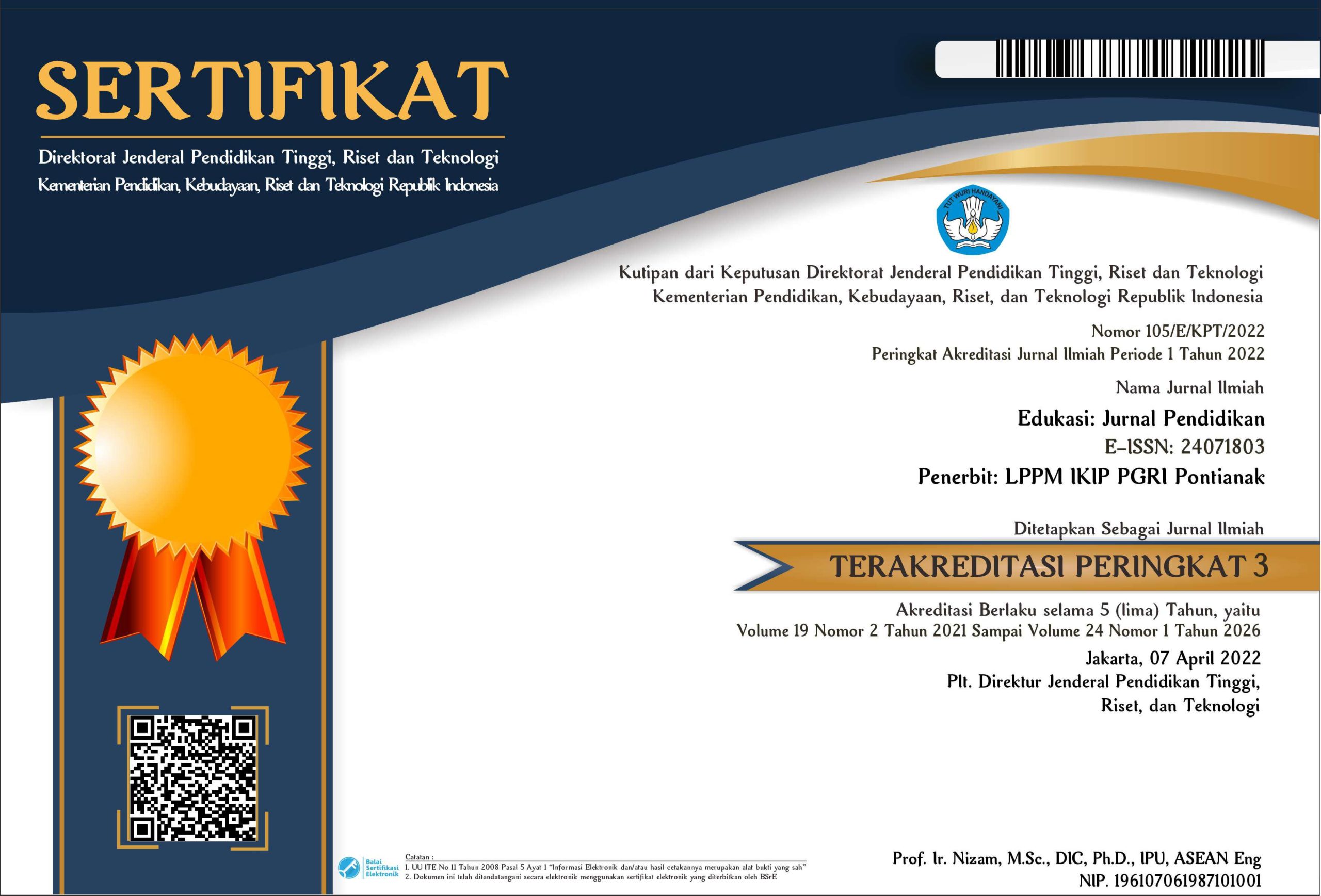Evaluasi Peran Pendidikan Kewirausahaan pada Sekolah Menengah Kejuruan
DOI:
https://doi.org/10.31571/edukasi.v17i2.1238Keywords:
pendidikan kewirausahaan, entrepreneurial self-efficacy, entrepreneurial attitude, entrepreneurial intention, entrepreneurship educationAbstract
Abstrak
Penelitian bertujuan untuk mengukur pengaruh entrepreneurial self-efficacy (ESE), entrepreneurial attitude (EA), dan entrepreneurial intention (EI) terhadap pendidikan kewirausahaan. Subjek penelitian yaitu seluruh siswa SMK Negeri Tempursari. Penelitian yang dilakukan merupakan penelitian populasi dengan jumlah 187 siswa. Instumen penelitian menggunakan angket. Teknik analisis data menggunakan MANOVA. Hasil penelitian yaitu: (1) Nilai rata-rata (mean) ESE, EA, dan EI siswa yang telah mendapatkan pendidikan kewirausahaan lebih tinggi apabila dibandingkan dengan nilai rata-rata siswa yang belum mendapatkan pendidikan kewirausahaan; dan (2) EA dan EI tidak terdapat pengaruh yang signifikan antara siswa yang telah mendapatkan pendidikan kewirausahaan dan siswa belum mendapatkan pendidikan kewirausahaan. Sedangkan pada aspek ESE terdapat pengaruh yang signifikan antara siswa yang telah mendapatkan pendidikan kewirausahaan dan siswa yang belum mendapatkan pendidikan kewirausahaan.
Abstract
The research aims to measure the effect of entrepreneurial self-efficacy (ESE), entrepreneurial attitude (EA), and entrepreneurial intention (EI) towards entrepreneurship education. The research subjects were all students of SMK Negeri Tempursari. Research conducted is a population study with a total of 187 students. The research instrument used a questionnaire. Data analysis used the MANOVA technique. The results of the study were: (1) The mean value of the ESE, EA, and EI of students who have received entrepreneurship education is higher when compared to the average value of students who have not received entrepreneurship education; and (2) EA and EI have no significant effect between students who have received entrepreneurship education and students who have not received entrepreneurship education. While in the ESE aspect there is a significant influence between students who have received entrepreneurship education and students who have not received entrepreneurship education.
Downloads
References
Ajzen, I. 2001. Nature and Operation of Attitudes. Annual Review of Psychology, 52(1): 27–58.
Al-Jubari, I., Hassan, A., & Liñán, F. 2018. Entrepreneurial Intention among University Students in Malaysia: Integrating Self-Determination Theory and the Theory of Planned Behavior. International Entrepreneurship and Management Journal, 15(4): 1323-1342.
Autio, E., Keeley, R., Klofsten, M., Parker, G. G., & Hay, M. 2001. Entrepreneurial Intent among Students in Scandinavia and in the USA. Enterprise and Innovation Management Studies, 2(2): 145–160.
Badan Pusat Statistik. 2018. Pengangguran Terbuka Menurut Pendidikan Tertinggi yang Ditamatkan 1986-2018 dalam https://www.bps.go.id/ statictable/2009/04/16/972/pengangguran-terbuka-menurut-pendidikan-tertinggi-yang-ditamatkan-1986---2018.html. Diakses tanggal 20 Desember 2018.
Bae, T. J., Qian, S., Miao, C., & Fiet, J. O. 2014. The Relationship between Entrepreneurship Education and Entrepreneurial Intentions: A Meta-Analytic Review. Entrepreneurship Theory and Practice, 38(2): 217–254.
Bird, B. 1988. Implementing Entrepreneurial Idea: The Case for Intention. Academy of Management Review, 13(3): 442–453.
Engle, R. L., Dimitriadi, N., Gavidia, J. V., Schlaegel, C., Delanoe, S., Alvarado, I., & Wolff, B. 2010. Entrepreneurial Intent: A Twelve-Country Evaluation of Ajzen’s Model of Planned Behavior. International Journal of Entrepreneurial Behaviour & Research, 16(1): 35–57.
Galvão, A., Marques, C. S., & Marques, C. P. 2018. Antecedents of Entrepreneurial Intentions among Students in Vocational Training Programmes. Education + Training, 60(7): 719-734.
Iakovleva, T., Kolvereid, L., & Stephan, U. 2011. Entrepreneurial Intentions in Developing and Developed Countries. Education + Training, 53(5): 353–370.
Kautonen, T., Van Gelderen, M., & Fink, M. 2015. Robustness of the theory Of Planned Behavior in Predicting Entrepreneurial Intentions and Actions. Entrepreneurship Theory and Practice, 39(3): 655–674.
Kickul, J., Gundry, L. K., Barbosa, S. D., & Whitcanack, L. 2009. Intuition Versus Analysis? Testing Differential Models of Cognitive Style on Entrepreneurial Self Efficacy and the New Venture Creation Process. Entrepreneurship Theory and Practice, 33(212): 439–453.
Krueger, N. F., Reilly, M. D., & Carsrud, A. L. 2000. Competing Models of Entrepreneurial Intentions. Journal of Business Venturing, 15(5): 411–432.
Linan, F. 2008. Skill and Value Perceptions : How Do They Affect Entrepreneurial Intentions? International Entrepreneurship and Management Journal, 4(3): 257–272.
Linan, F., & Chen, Y. 2009. Development and Cross-Cultural Application of A Specific Instrument to Measure Entrepreneurial Intentions. Entrepreneurship Theory and Practice, 33(3): 593–618.
Mahendra, A. M., Djatmika, E. T., & Hermawan, A. 2017. The Effect of Entrepreneurship Education on Entrepreneurial Intention Mediated by Motivation and Attitude among Management Students, State University of Malang, Indonesia. International Education Studies, 10(9): 61-69.
Marques, C. S., Ferreira, J. J., Gomes, D. N., & Rodrigues, R. G. 2012. Entrepreneurship Education: How Psychological, Demographic and Behavioural Factors Predict the Entrepreneurial Intention. Education + Training, 54(8): 657–672.
McGee, J. E., Peterson, M., Mueller, S. L., & Sequeira, J. M. 2009. Entrepreneurial Self-Efficacy: Refining the Measure. Entrepreneurship Theory and Practice, 33(4): 965–988.
Nabi, G., Walmsley, A., Liñán, F., & Akhtar, I. 2018. Does Entrepreneurship Education in the First Year of Higher Education Develop Entrepreneurial Intentions? The Role of Learning and Inspiration. Studies in Higher Education, 43(3): 452–467.
Newman, A., Obschonka, M., Schwarz, S., Cohen, M., & Nielsen, I. 2018. Entrepreneurial Self-Efficacy: A Systematic Review of the Literature on Its Antecedents and Outcomes, and an Agenda for Future Research. Journal of Vocational Behavior, 110(B): 403-419.
NowiÅ„ski, W., Haddoud, M. Y., LanÄariÄ, D., Egerová, D., & Czeglédi, C. 2017. The Impact of Entrepreneurship Education, Entrepreneurial Self-Efficacy and Gender on Entrepreneurial Intentions of University Students in the Visegrad Countries. Studies in Higher Education, 44(2): 361-379.
Nurmaliza, Caska, & Indrawati, H. 2018. Analysis of Factors Affecting Entrepreneurial Interest of Vocational High School Students in Pekanbaru. Journal of Educational Sciences, 2(2): 42–51.
Rauch, A. & Hulsink, W. 2015. Putting Entrepreneurship Education Where the Intention to Act Lies : An Investigation Into the Impact of Entrepreneurship Education on Entrepreneurial Behavior. Academy of Management Learning & Education, 14(2): 187–204.
Solesvik, M., Westhead, P., & Matlay, H. 2014. Cultural factors and entrepreneurial intention. Education + Training, 56(8): 680–696.
Solesvik, M. Z. 2013. Entrepreneurial Motivations and Intentions: Investigating the Role of Education Major. Education + Training, 55(3): 253–271.
Sun, H., Lo, C. T., Liang, B., & Wong, Y. L. B. 2016. The Impact of Entrepreneurial Education on Entrepreneurial Intention of Engineering Students in Hong Kong. Management Decision, 55(7): 1371-1393.
Sunyoto, Widodo, J., & Samsudi. 2018. Development of Apprenticeship Model for Vocational School Based on Entrepreneurship. AIP Conference Proceedings, 1941(1): 020039-1 - 020039-8.
Thompson, E. R. 2009. Individual Entrepreneurial Intent: Construct Clarification and Development of an Internationally Reliable Metric. Entrepreneurship Theory and Practice, 33(3): 669–695.
Westhead, P. & Solesvik, M. Z. 2015. Entrepreneurship Education and Entrepreneurial Intention: Do Female Students Benefit? International Small Business Journal, 34(8): 979–1033.
Downloads
Published
How to Cite
Issue
Section
License
Authors who publish in this journal agree to the following terms:
- Authors retain copyright and grant the journal the right of first publication with the work simultaneously licensed under a Creative Commons Attribution License (CC-BY-NC) that allows others to share the work with an acknowledgment of the work's authorship and initial publication in this journal.
- Authors are able to enter into separate, additional contractual arrangements for the non-exclusive distribution of the journal's published version of the work (e.g., post it to an institutional repository or publish it in a book), with an acknowledgment of its initial publication in this journal.
- Authors are permitted and encouraged to post their work online (e.g., in institutional repositories or on their website) prior to and during the submission process, as it can lead to productive exchanges, as well as earlier and greater citation of published work.















